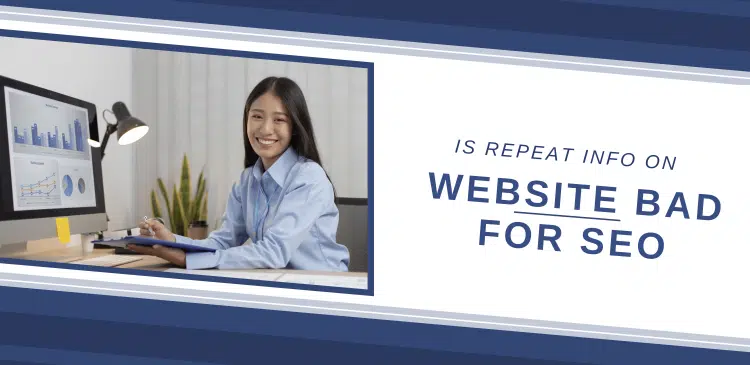Is Repeat Info on a Website Bad for SEO

In SEO, the content of your website is one of the most important things that determines where it shows up on search engines like Google. And yet, people often wonder if having the same information on a website too many times is bad for SEO. It’s time to dig deeper into this subject and explain what it means, how it can be used with some suggestions.
Understanding SEO and Content Uniqueness
What is SEO?
SEO is a technique used on a website with the aim of making it appear on the SERPs. It is the process of adjusting different factors such as the content, the layout of the site, and how friendly it is to the visitor so as to increase traffic. Hence, it can be seen that content type is one of the most important and used factors in SEO.
The Importance of Content Uniqueness
Popular search engines such as Google prefer fresh and good quality content. The reason for this is that they want to give users the best results when they look. The main reason you should avoid duplication is that it makes the CQM unsure of which site or version to index and rank.
The Impact of Duplicate Content on SEO
Duplicate Content Within a Single Website
There are several cases in which duplicate content is made on the same website by mistake from the following categories:
URL parameters: When two or more URLs point to the same web page but possess different signs that make them unique.
Session IDs: URLs that include the result of session identification for logged in users such as user IDs.
Printable versions: A web version and a printable version of the same content.
Negative Implications
Crawling and Indexing: One problem could be that different versions of the same page with different URLs get ranked differently and get more linkage value than the other version. Search engines might see these versions as two separate URLs and make two copies of the page.
Spread Out Authority: If there are so many pages that are considered as duplicates, their authority will be less than that of a page with good authority and therefore gets buried.
Mitigation Strategies
Canonical tags: These are used to provide hints to specific search engines on which particular web page is original among the many that serve similar content to visitors.
URL Parameters Handling: Any URL having extra session IDs or other dummy parameters must be provided with the no index tags.
Robots.txt: It helps in defining which pages on the websites should and should not be selected for crawling.
Duplicate Content Across Different Websites
Depending on the level of proximity, that is, when content is completely identical or very similar in different websites, different problems occur:
Negative Implications
Content Scraping: If the content is scraped, it will show up in the search queries in the form of the scraper site, instead of the original site that was scraped.
Penalties: In some extreme instances, Google may penalize any website found engaged in those unlawful practices of duplicity.
Mitigation Strategies
Copyright Protection: For plagiarized work, the content owner may use Copyscape in verification.
Legal Action: The use of emails/mails, consider sending legal notices, cease-and-desist letters or proceed to give legal action against the violators.
Sustainability and Innovation: Focus on uniqueness and quality of the content offered.
Best Practices for Managing Content Uniqueness
Creating High-Quality, Unique Content
Research and Originality: Conduct proper and effective research on the work you are covering in the blogs so that your ideas and content you present are original. In an effort to ensure that a certain piece of writing is original, use plagiarism checker tools.
Engaging Content: It refers to providing good quality content that is capable of satisfying the needs of the customers. There is actually a two in one benefit as this enhances the SEO as well as enhances the whole flow of the users.
Structuring Content Effectively
Headings and Subheadings: Use clear headings (H1, H2, H3) to structure your content logically. This improves readability and SEO.
Internal linking: Direct your content consumers to other different pages within your website in order to share out link juice.
Regular Content Audits
Remove Duplicate Content: Perform frequent checks so as to eliminate duplicate content.
Accuracy of Content: Ensure all the information posted is up-to-date to ensure its credibility to users.
The website will do better if you make it special and of high quality and use tags and settings like canonical tags and robots.txt correctly. Give your audience something of value while also following these search engine rules.
